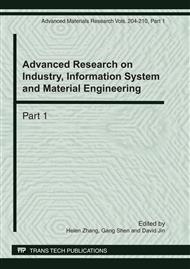p.1266
p.1270
p.1274
p.1279
p.1283
p.1287
p.1291
p.1295
p.1299
The Model and Algorithm for Computing Market Share in Competitive Service Supply Chains
Abstract:
This paper studies the problem of computing market share in competitive service supply chains characterized by service congestion phenomena. Heterogenous customers choose services based on the utility maximization principle taking congestion into account. We use customer choice theory and infinite dimensional variational inequality to model the customer behavior and estimate service product’s market share. An extended Frank and Wolfe algorithm for solving this market share problem and a numerical example is given. The results shows that that service providers with poor service quality can also win some market share due to customers’ aversion to congestion.
Info:
Periodical:
Pages:
1283-1286
Citation:
Online since:
February 2011
Authors:
Price:
Сopyright:
© 2011 Trans Tech Publications Ltd. All Rights Reserved
Share:
Citation:


